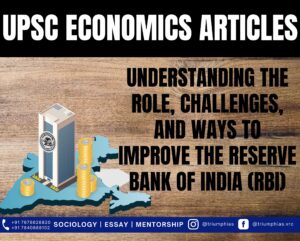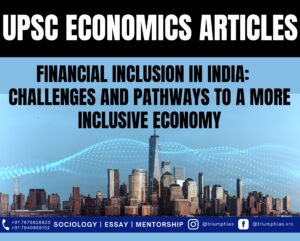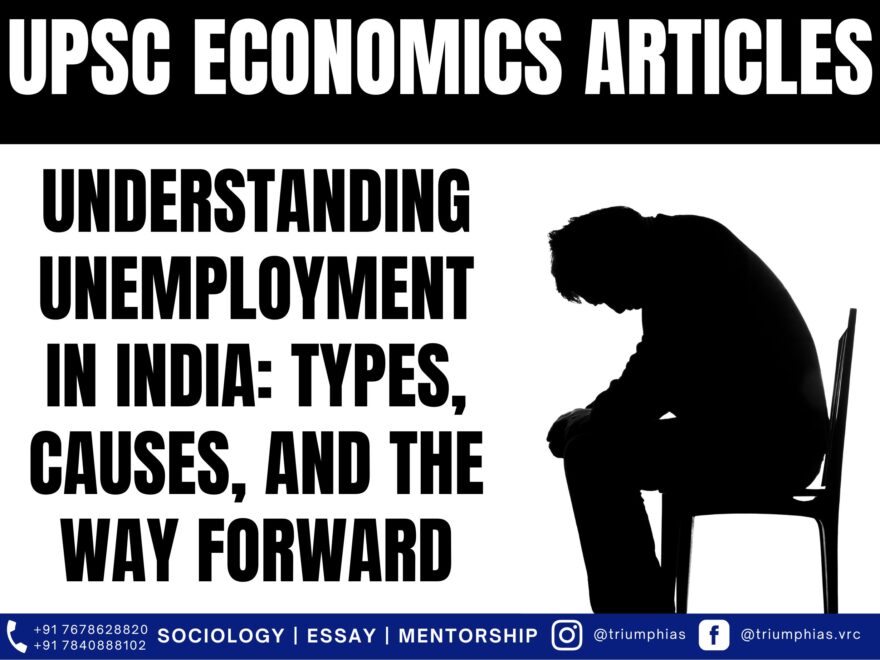Unemployment in India
(Relevant for Economics Section of General Studies Paper Prelims/Mains)

Unemployment
Unemployment takes place when an individual actively seeking employment faces the inability to secure a job. Unemployment is frequently employed as an indicator of the economic well-being of a nation.
Types of unemployment
- Disguised Unemployment: This phenomenon occurs when there are more employed individuals than necessary. This is particularly evident in India’s agricultural and unorganized sectors.
- Seasonal Unemployment: This type of unemployment takes place during specific periods of the year. Agricultural labourers in India frequently experience periods of joblessness due to the seasonal nature of their work.
- Structural Unemployment: This category of unemployment arises from a mismatch between job opportunities available in the market and the skill sets possessed by the available workforce.
- Cyclical Unemployment: This form of unemployment is a consequence of the business cycle, where joblessness increases during economic downturns and decreases during periods of economic growth.
- Technological Unemployment: This refers to job losses caused by technological advancements that render certain roles obsolete.
- Frictional Unemployment: Also known as Search Unemployment, this type refers to the transitional phase when individuals are between jobs or actively seeking new employment opportunities.
- Vulnerable Employment: This pertains to informal labour where individuals lack proper job contracts and legal protections. Since their work is not documented, they are considered “unemployed.” This type of unemployment is prevalent in India.
Causes of Unemployment in India
- Social Factors: The caste system is prevalent in India, leading to certain castes being prohibited from certain types of work in specific regions.
- Within large joint families engaged in significant business ventures, there often exist individuals who do not actively participate in work and instead rely on the collective family income.
- Rapid Population Growth: The continuous increase in population has emerged as a significant challenge in India, serving as a key contributor to unemployment.
- Agricultural Dominance: Despite significant technological advancements, nearly half of India’s workforce remains dependent on agriculture, which itself is underdeveloped and provides seasonal employment.
- Decline of Cottage and Small Industries: The advancement of large-scale industries has adversely affected cottage and small-scale enterprises. The output of cottage industries has dwindled, leading to unemployment among artisans.
- Labour Immobility: The mobility of labour in India remains limited. Ties to family and local communities often deter individuals from seeking work in distant locations. Additionally, factors such as language, religion, and climate further impede mobility.
- Flaws in the Education System: In a rapidly evolving job market, specialization has become crucial. However, India’s education system often fails to equip individuals with the necessary skills for specialized jobs, resulting in unemployment for those willing to work but lacking the required expertise.
Way forward
- Encouraging Labour-Intensive Sectors: Numerous labour-intensive manufacturing fields exist in India, including food processing, leather and footwear, woodworking, furniture production, textiles, apparel, and garment manufacturing. Tailored initiatives for each sector are necessary to generate employment opportunities.
- Decentralization of Industries: The dispersion of industrial activities across regions is essential to ensure employment opportunities are accessible to people in every area. Focusing on rural development can help curb the migration of rural residents to urban centers, subsequently reducing pressure on urban job markets.
- Formulating a National Employment Policy: Establishing a comprehensive National Employment Policy (NEP) is imperative. Such a policy should encompass a wide range of multidimensional interventions addressing diverse social and economic concerns that impact various policy domains, extending beyond labour and employment matters.
Sample Question for UPSC Sociology Optional Paper:
Question 1: What is the impact of the caste system on unemployment in India?
Answer: The caste system contributes to unemployment by restricting certain castes from specific types of work, thereby limiting employment opportunities.
Question 2: How does rapid population growth contribute to unemployment in India?
Answer: Rapid population growth in India exacerbates unemployment by increasing the number of job seekers, thereby outstripping the rate at which new jobs are created.
Question 3: Why is vulnerable employment considered a type of unemployment in India?
Answer: Vulnerable employment is considered a type of unemployment because individuals in this category lack proper job contracts and legal protections, making their work status unstable.
Question 4: What are the limitations of India’s education system in addressing unemployment?
Answer: The education system often fails to provide individuals with the specialized skills required in a rapidly evolving job market, resulting in a mismatch between job opportunities and skill sets.
Question 5: How can decentralization of industries help in reducing unemployment in India?
Answer: Decentralization can help in spreading employment opportunities across regions, reducing the migration pressure on urban job markets and providing employment in rural areas.
Related Blogs …
 |
 |
To master these intricacies and fare well in the Sociology Optional Syllabus, aspiring sociologists might benefit from guidance by the Best Sociology Optional Teacher and participation in the Best Sociology Optional Coaching. These avenues provide comprehensive assistance, ensuring a solid understanding of sociology’s diverse methodologies and techniques.
Unemployment in India, Types of Unemployment, Causes of Unemployment, Labour-Intensive Sectors, National Employment Policy, Decentralization of Industries, Education System Flaws, Social Factors, Unemployment in India, Types of Unemployment, Causes of Unemployment, Labour-Intensive Sectors, National Employment Policy, Decentralization of Industries, Education System Flaws, Social Factors

Choose The Best Sociology Optional Teacher for IAS Preparation?
At the beginning of the journey for Civil Services Examination preparation, many students face a pivotal decision – selecting their optional subject. Questions such as “which optional subject is the best?” and “which optional subject is the most scoring?” frequently come to mind. Choosing the right optional subject, like choosing the best sociology optional teacher, is a subjective yet vital step that requires a thoughtful decision based on facts. A misstep in this crucial decision can indeed prove disastrous.
Ever since the exam pattern was revamped in 2013, the UPSC has eliminated the need for a second optional subject. Now, candidates have to choose only one optional subject for the UPSC Mains, which has two papers of 250 marks each. One of the compelling choices for many has been the sociology optional. However, it’s strongly advised to decide on your optional subject for mains well ahead of time to get sufficient time to complete the syllabus. After all, most students score similarly in General Studies Papers; it’s the score in the optional subject & essay that contributes significantly to the final selection.
“A sound strategy does not rely solely on the popular
Opinion of toppers or famous YouTubers cum teachers.”
It requires understanding one’s ability, interest, and the relevance of the subject, not just for the exam but also for life in general. Hence, when selecting the best sociology teacher, one must consider the usefulness of sociology optional coaching in General Studies, Essay, and Personality Test.
The choice of the optional subject should be based on objective criteria, such as the nature, scope, and size of the syllabus, uniformity and stability in the question pattern, relevance of the syllabic content in daily life in society, and the availability of study material and guidance. For example, choosing the best sociology optional coaching can ensure access to top-quality study materials and experienced teachers. Always remember, the approach of the UPSC optional subject differs from your academic studies of subjects. Therefore, before settling for sociology optional, you need to analyze the syllabus, previous years’ pattern, subject requirements (be it ideal, visionary, numerical, conceptual theoretical), and your comfort level with the subject.
This decision marks a critical point in your UPSC – CSE journey, potentially determining your success in a career in IAS/Civil Services. Therefore, it’s crucial to choose wisely, whether it’s the optional subject or the best sociology optional teacher. Always base your decision on accurate facts, and never let your emotional biases guide your choices. After all, the search for the best sociology optional coaching is about finding the perfect fit for your unique academic needs and aspirations.
To master these intricacies and fare well in the Sociology Optional Syllabus, aspiring sociologists might benefit from guidance by the Best Sociology Optional Teacher and participation in the Best Sociology Optional Coaching. These avenues provide comprehensive assistance, ensuring a solid understanding of sociology’s diverse methodologies and techniques. Sociology, Social theory, Best Sociology Optional Teacher, Best Sociology Optional Coaching, Sociology Optional Syllabus.
Best Sociology Optional Teacher, Sociology Syllabus, Sociology Optional, Sociology Optional Coaching, Best Sociology Optional Coaching, Best Sociology Teacher, Sociology Course, Sociology Teacher, Sociology Foundation, Sociology Foundation Course, Sociology Optional UPSC, Sociology for IAS,
Follow us :
🔎 https://www.instagram.com/triumphias
🔎https://www.youtube.com/c/TriumphIAS
https://t.me/VikashRanjanSociology
Find More Blogs
|
Scope of the subject and comparison with other social sciences |
|||
|
|
|
|
Modernity and social changes in Europe |


One comment